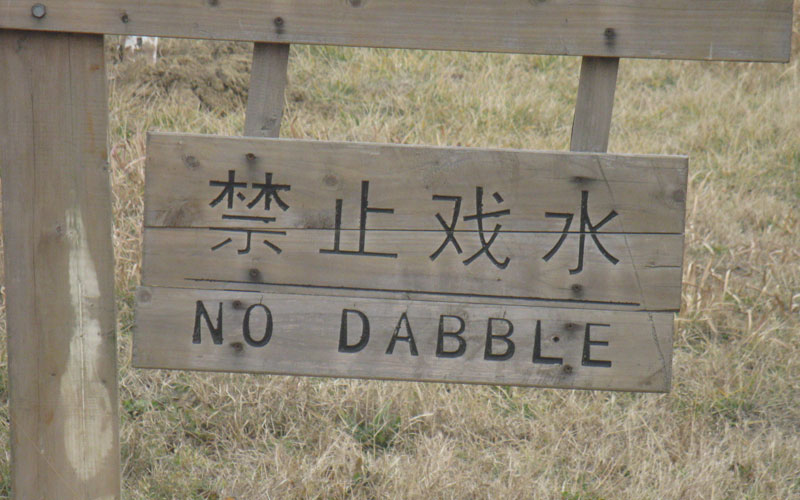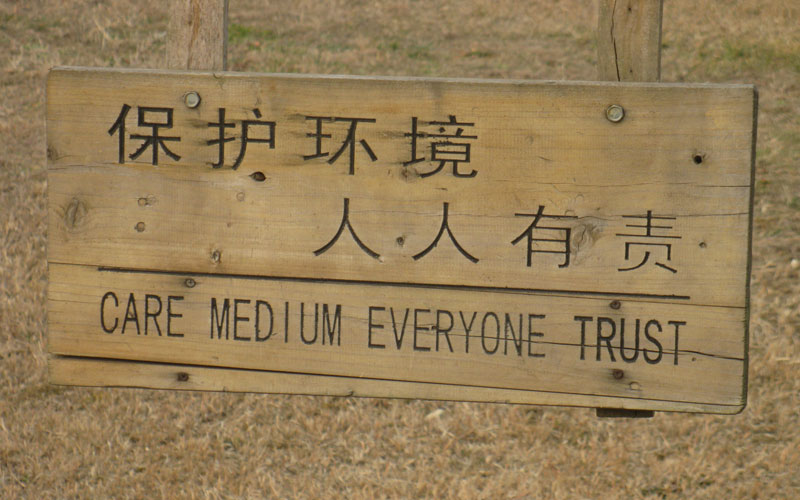No dabble
« previous post | next post »
Sign at a Chinese park:

It's short, sweet, and simple, a charming specimen of Chinglish. The only problem is that few English speakers would understand what it's about. Even if it were in the more idiomatic form "No dabbling," most English readers would first think that it meant something like "no superficial messing around". The Chinese, however, reads:
Jìnzhǐ xì shuǐ
禁止戏水
("it is prohibited to play around in the water," i.e., "swimming prohibited")
This is ironic, since the original meaning of "dabble" is "to play around in the water."
At first, I thought that's all I'd write for this post, but then I came upon the source of this "No dabble" sign online, and discovered that it was accompanied by a couple of other signs in the same park, neither of which makes much sense in their Chinglish version. Here's the second sign:

The Chinese reads:
Àihù gōngwù, shùmù
爱护公物,树木
("cherish / take care of public property and trees")
And here's the third sign:

The Chinese reads:
Bǎohù huánjìng, rén rén yǒu zé
保护环境,人人有责
("protection of the environment is everyone's responsibility")
This one is rendered perfectly by Google Translate.
[A tip of the hat to Jonathan Smith]
Evan said,
October 19, 2011 @ 9:48 pm
why is it ironic that the Chinese and the original English match? Isn't that a reasonable explanation (they used an outdated translation dictionary)?
Keith said,
October 19, 2011 @ 9:57 pm
Evan, what does ironic even mean?
boi ma said,
October 19, 2011 @ 10:03 pm
ironic, since most native speaker wouldnt know it
Keith Clarke said,
October 19, 2011 @ 11:05 pm
"All along the backwater, Through the rushes tall, Ducks are a- dabbling, Up tails all!"
How popular is the Wind in the Willows in China?
Stan said,
October 20, 2011 @ 3:28 am
"it is prohibited to play around in the water," i.e., "swimming prohibited"
Or "No paddling", a phrase that pops up in these contexts and has a pretty similar sound to "No dabbling".
Trimegistus said,
October 20, 2011 @ 7:05 am
Dabbling seemed pretty straightforward, but it took me a long time to get how "environment" turned into "medium."
Ryan S said,
October 20, 2011 @ 5:12 pm
What makes "No dabbling" a more idiomatic form than "No dabble"?
Victor Mair said,
October 20, 2011 @ 6:12 pm
@Ryan S
Think "no trespassing," "no surfing," "no swimming," "no hunting," etc., then think of these prohibitions sans the -ing.
Suzanne Kemmer said,
October 20, 2011 @ 11:44 pm
'most English readers would first think that it meant something like "no superficial messing around" '
Would they? "Dabbling one's feet/toes" sound pretty idiomatic to me and refer to dipping and moving those body parts around in water. I remember the word being used (when I was a kid) for either dangling the feet in water from, say, a pier, but more often for walking splashily in shallow water (what the British call "paddling"); it was used in contrast with swimming, when we were around water, e.g. (on lakeshore): "Can we go swimming?" "No but you can dabble your feet." I guess for some people the metaphorical use has overshadowed the literal one. But some of us still get a strong watery image even when the word is used for desultory pursuits. I got the 'keep out of the water' reading right away from the English word on the sign, plus probably the pragmatic knowledge of what kinds of things outdoor signs warn against.
Ken Brown said,
October 21, 2011 @ 4:51 pm
@Ryan S: just that English speakers are far more likely to say it.
AlisonC said,
October 28, 2011 @ 1:57 pm
@Trimegistus 'medio ambiente' is 'environment' in Spanish. That's all the explanation I can offer since I don't speak or read Chinese at all.